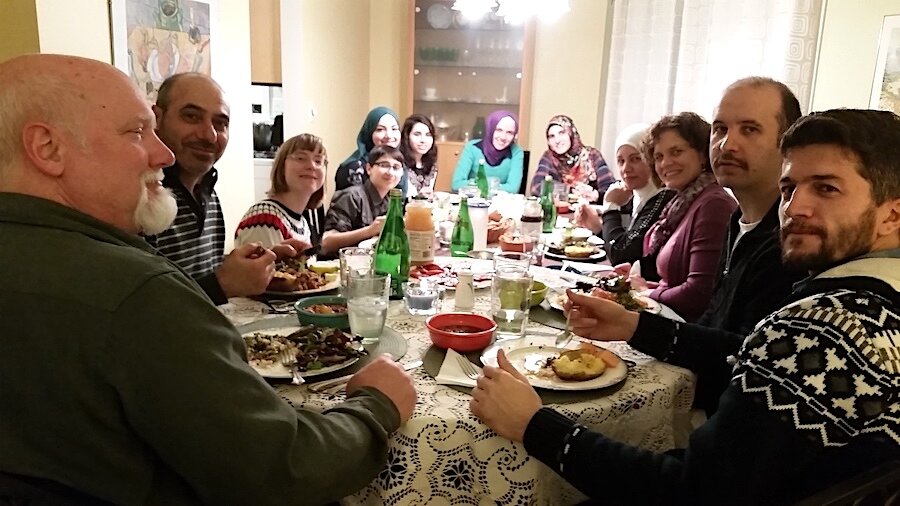Brit Milah, A Rabbi's Kiss, and The Birth of Multi-Faith Friendship
by Thomas Davis
This week I made my second-ever visit to a synagogue and for the first time participated in a brit milah, the Jewish circumcision ritual. Rabbi Eric Solomon and Rabbi Jenny Solomon, of Beth Meyer Synagogue in Raleigh, recently welcomed their son into the world, and they honored me immensely by inviting me to join other friends and family at the ceremony.
The brit milah turned out to be one of the more memorable events of my life. It was nothing short of breathtaking to watch a newborn enter into the Abrahamic Covenant, to hear his name announced for the first time, and to join this Jewish community in singing prayers of blessing over the little bundle of joy. In my experience of Christian practice, there is nothing that matches the rich, beautiful, and emotive way that our Jewish friends welcome their children into the world.
After the ceremony, I had a chance to greet the proud father and rabbi. He and I embraced in a hug as I told him it was clear that God’s face was shining on him and that my heart was full of joy. We cried tears of happiness together, and as I departed he gave me a rabbinical kiss on the cheek!
Another time, I would be eager to tell you more about the brit milah. For now, however, I want to explain how I got there.
August 28, 2011—Abraham Build is a coalition of Muslims, Christians, and Jews who are partnering with Habitat for Humanity to build a home for a deserving family. Peace Catalyst International is one of the partners. On this day at the Abraham Build ground-breaking, a couple of us PCI folk meet Rabbi Eric Solomon. He invited us out for coffee.
October 6, 2011—Two PCI colleagues met Rabbi Solomon at Starbucks. As these men got to know one another and share their unique faith perspectives, they discovered significant common ground. Before the THREE-HOUR meeting was over, Rabbi Solomon said, “I love what you’re doing in the Muslim and Christian communities, and we Jews would love to be involved as well!”
December 8, 2011—A colleague and I enjoyed a dinner meeting with Rabbi Solomon and our bond was strengthened even more.
December 17, 2011—Jeff Burns, a PCI colleague, spoke at Beth Meyer Synagogue. By having Jeff speak, Rabbi Solomon risked ridicule in his own community. However, Jeff presented a wonderful message, and the response from the Jewish community was quite positive.
January 31, 2012—Synagogue member Steve LaSala reached out to us. An entrepreneur and humanitarian, Steve invited me to lunch to build friendship and to discuss ways we can work together. Our two-and-a-half-hour meeting ended too soon, but before it did, I asked Steve tons of questions about his practice of Judaism, and he invited me to share with him my faith perspective as a Jesus follower.
February 2012—Steve, my new Jewish friend, emailed me to bring up a news story regarding an injustice against homeless people in Raleigh. I invited Steve to present the issue at our next PCI team meeting, and now we are in dialogue with Muslims, Christians, and Jews about a multi-faith effort to bless the homeless.
My point in sharing this chronology is to show that peacemaking is not rocket science. Ultimately, it’s about friendship, and Rabbi Solomon and Steve LaSala masterfully modeled the three foundational steps of friend-making:
1. They invited us to be their friends. In elementary school, the protocol was to send over a note asking prospective friends to check “yes” or “no.” As adults, the check boxes are replaced by invitations to coffee or lunch, but the idea is the same—ask.
2. They were kind. Find ways to encourage and affirm rather than criticize and find fault.
3. They approached us as learners. This, in spite of the fact that they have MUCH to teach us. Remember that we are all created in the image of God, and assume that EVERYONE you meet has something to teach you about life and even about the ways of God.
I honor Rabbi Solomon and Steve LaSala for being bridge-builders. They reached out to us, across an ideological divide, to build friendships for the common good. I encourage you to follow their example by beginning a friendship with someone whose perspective is different than your own!
More by Thomas Davis at his blog: http://www.incomparabletreasure.com/










